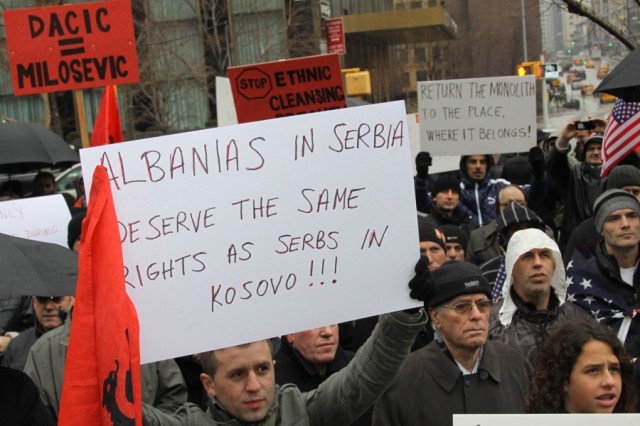The Albanian American community is deeply concerned with the deterioration of the human rights and the rising tensions in Presheva Valley, in South Serbia.
Rather than building bridges with the ethnic Albanian community, the government of Serbia has once again resorted to violence by forcibly removing, from the center of Presheva town, a monument that honors the local martyrs.
The Koncul Agreement that ended the war with the intermediation of the international community promised crucial changes in the situation of the Albanians in South Serbia.
Albanians in the Presheva Valley suffer with a 70% unemployment rate; border crossings to vital Macedonian market remain closed; the Serbian government built one of its largest military bases. Furthermore, Serbian PM Mr. Dacic has returned to the dangerous rhetoric of the 90s, the time when Serbia started four consecutive wars in the region. He has branded the fallen insurgents as “terrorists” and compared UÇPMB to Al Qaeda.
This behavior by the Serbian government has no place in Europe, particularly when Serbia is waiting for a date to begin the accession talks with the European Union.
We call upon the Serbian government:
• To end the repression and discrimination of Albanians in the Presheva Valley
• To implement of the Koncul Agreement in full.
• To guarantee equal rights for Albanians in the Presheva Valley, equal to those of the Serbian minority in north Kosova.
• Return the monument of the Liberation Army of Presheva, Medvegje and Bujanovc to its designated place.
• End ethnic conflict and provocations by Serbian police and military in the Presheva Valley.
• We call upon the EU, UN, and the US to send an international presence in the Presheva Valley to develop a long term strategy for insuring equal treatment of ethnic Albanians in Serbia.
• We stand with our brothers and sisters in Presheva Valley in the struggle for human rights and dignity. After investing so much on peace and stability in the region, no one should be allowed to turn back the clock for their domestic political or electoral narrow interests.
